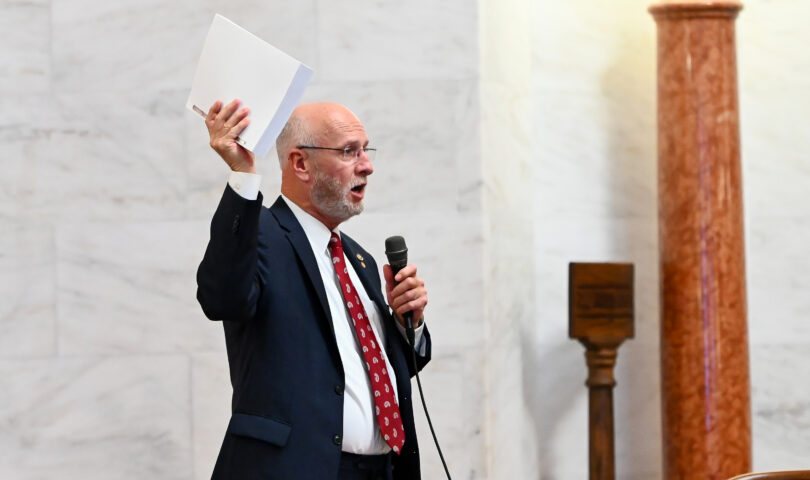CHARLESTON – The Senate spent just over two hours debating the governor’s COVID-19 vaccine exemption bill, HB 335, and barely passed it with a 17-16 vote.
HB 335 says an employer that requires vaccination for hiring or continued employment must grant certain exemptions, based on receiving from the current or prospective employee either a certification from a physician or nurse practitioner that a vaccine is not safe for that person, the person has a specific precaution or the person has natural antibody immunity from COVID-19 exposure or recovery; or a notarized certificate of religious objection.
The bill prohibits penalizing or discriminating against current or prospective employees who seek exemption and provides for injunctive relief in court.
Members rejected a proposed amendment from Sen. Ron Stollings, D-Boone, that would have replaced the bill with a paragraph saying all state residents are entitled to religious and medical exemptions granted under the Americans with Disabilities Act and Title VII of the Civil Rights Act.
They adopted one offered by Finance Chair Eric Tarr, R-Putnam, to address concerns the bill will conflict with federal law and put hospitals and businesses in a bind.
Tarr’s amendment added a severability clause saying any portion of the bill found unconstitutional won’t affect the rest of the bill. Members passed it over objections by Sen. Mike Romano, D-Harrison, that the amendment is irrelevant because religious and medical objections are found in federal law, not in the Constitution.
Objections were bipartisan. Romano said, “This bill appears to me to be awfully reckless.”
It allows for a blanket, unverifiable religious exemption, he said, that’s not reflected in federal law. “A religious exemption is something that’s sacred in this country; it requires a deeply held religious belief.” An employee can’t just object on a whim. “We are free from oppressive laws, not reasonable laws.”
All three physicians in the Senate objected. Sen. Mike Maroney, R-Marshall, said no one consulted them, and that the bill oversteps the Legislature’s oversight of business.
“It’s unbelievable to me that we are going to pass a mandate telling private citizens and businesses what to do,” he said. “It’s the biggest piece of trash I’ve ever seen dumped down the throats of private businesses. … God help West Virginia.”
Stollings said the bill requires businesses to accept all exemption requests and removes existing processes. Every major business and medical organization in the state opposes it, and it will slow the process of reaching herd immunity where about 80% of the state’s residents are vaccinated.
The third physician, Majority Leader Tom Takubo, R-Kanawha, talked about protecting those who have no ability to protect themselves and no choice. “Freedom only goes so far until it bleeds on someone else’s freedom.”
Sen. Ryan Weld, R-Brooke, said nobody should be forced to receive a vaccine if they don’t want it, but “this is one of the worst, most poorly drafted pieces of legislation I’ve seen in my life.”
It sets up competing standards for medical organizations, and for businesses depending on how many people they employ. He predicted they’ll have to come back and fix it after the OSHA and Medicaid rules are issued.
Speaking for the bill, Sen. Rollan Roberts, R-Raleigh, said the emails they’ve received about the bill have been 10-to-1 in favor.
Sen. Randy Smith, R-Tucker, said he requested a special session on this topic months ago. Questions about masks and vaccines have divided families and friends. He again cited an email from a 21-year-old nursing student who told him she gave up her career for fear of the vaccine.
“A lot of people do not trust the government and they do not trust pharmaceutical companies,” Smith said.
President Craig Blair, R-Berkeley, came down to the floor to support the bill.
Despite all the rhetoric, Republicans do care about the people, he said, and pass bills to allow businesses to do what they do best.
“Don’t think for a minute government can’t overreach into people’s personal lives,” he said.
Blair said he’s vaccinated and believes people should get vaccinated, but it’s a personal choice.
The vaccine research isn’t far enough along, he said. “Frankly I think this hearkens back Nazi Germany,” with the government using federal dollars to coerce people to obey the state.
He’s received thousands of emails, he said, with many people saying the Senate was blocking passage of the bill. But that’s not so.
They needed 18 votes, he said. “I counted 18 votes. We’re here today. … I think what we’re doing here today is the right thing to do, regardless of what the lawyers or the doctors tell us.” A person doesn’t have to be a specialist to know right from wrong.
Five Republicans joined all 11 Democrats to vote against it: Maroney, Takubo, Weld, Sen. Charles Clements, R-Wetzel, and Sen. Charles Trump, R-Morgan.
The vote to make the bill effective from passage failed. It required a two-thirds vote but gained only 18. That means it will take effect 90 days from passage.
The bill returns to the House for concurrence with the Tarr amendment when the House reconvenes at 6 p.m. Wednesday.
Tweet David Beard @dbeardtdp Email dbeard@dominionpost.com




